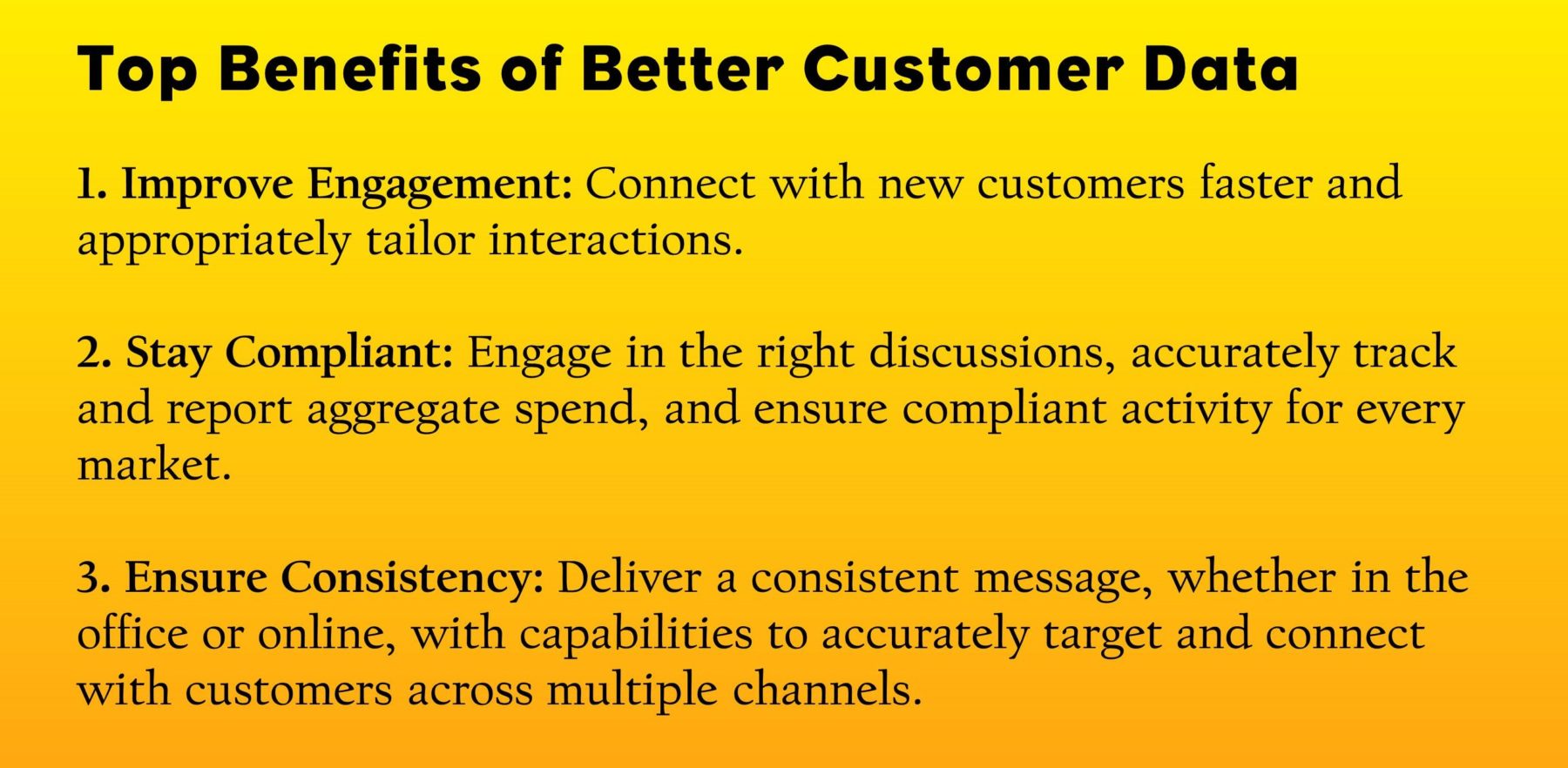Data is foundational to smarter, better decision making and more productive relationships with customers. That is why 78% of commercial operations teams in the life sciences industry have embarked on a data quality initiative, or will do so in the next two years, according to a new survey.
In this complex era of personalized medicine and groundbreaking drug innovation, sales and marketing teams are charged with getting more information to more physicians. At the same time, rep access to doctors is changing1 and life sciences companies must comply with evolving regulations—making regulatory compliance sometimes a moving target. As a result, it is more complicated and challenging to reach healthcare professionals (HCPs) and deliver important information needed to inform doctors’ therapy decisions for patients.
In fact, 87% of respondents in a recent industry survey say they face data quality challenges.2 For example, sales reps often have incorrect addresses for HCP offices, don’t know which HCPs to contact, or have outdated information about a physician’s specialty and license status. Because of this, it is estimated that as many as one in 25 sales calls is unsuccessful.3 More important, incorrect data can lead to compliance risks.
In response to these dynamics, the life sciences industry is focusing on improving engagement with HCPs by delivering timely, accurate product information through multiple tools and channels. Specifically, two-thirds of life sciences decision makers prioritize customer data quality initiatives for more effective multichannel engagement.4 Reliable data is essential to increasing sales and marketing efficiency, improving analysis and decision making, and gaining a complete, real-time view of the customer. When the right customer data flows into a customer relationship management (CRM) system, sales teams can achieve meaningful interactions with HCPs and stay aligned with compliance mandates. For example, accurate specialty data helps sales reps avoid off-label detailing.
Accuracy goes hand-in-hand with timeliness. As important as it is for life sciences companies to gather and efficiently utilize correct data, it is equally as crucial that the data be up to date. And, therein lies the rub. In recent years, the industry has had access to a proliferation of data (i.e., Rx data, addresses from associations, emails, and more) from a range of sources—internal and external. Such multi-sourced, non-integrated data makes it difficult to establish a single, accurate “golden record” for each HCP. Further, very often the data is old, which is becoming much more dangerous.
Today more than ever, physicians are trading independent practices for group practices, integrated delivery networks, and hospitals at a high frequency. In fact, 50% of the data change requests that come to Veeva’s U.S. data research facility are either address- or affiliation-related changes. These changes are difficult to keep up with if companies are not leveraging modern technology, casting a wide net, and verifying each data change quickly. In fact, many independent providers of physician data routinely provide stale, inaccurate, or outdated information because coverage is limited and changes are not verified and updated in a timely manner—some providers only complete data updates in bulk once a year.
As companies continue to emphasize the importance of data quality to deliver up-to-date, complete, consistent information that the entire organization can leverage, here are five essentials for success.
Essential #1: Eliminate the Burden of Data Integration
Many companies “own” the complicated process of integrating data within their on-premise CRM applications, but cloud technology can provide simplified data integration that can send accurate, real-time data to sales teams faster. This enhances engagement efforts and gets the right information to customers via the channels they prefer. Also, teams can avoid duplicating data by consolidating data providers based on customer demographics and compliance requirements.
Essential #2: Get Proactive on Compliance
It is difficult to keep up with ever-changing compliance rules, especially for busy sales and marketing teams. Companies must establish dedicated data resources to monitor federal and state changes so data is updated before new regulations take effect. This ensures that data is ready before a company needs it and safeguards reps against non-compliant activity.
Essential #3: Leverage Expert Data Stewards
It is important to select an expert data stewardship team that can maintain customer data efficiently and cost-effectively. Leveraging in-depth processes for continually monitoring, analyzing, and updating data, as well as eliminating duplication and inconsistencies, can streamline the data management process. Data stewards can deliver the highest levels of quality and timeliness so reps have the information they need to be effective.
Essential #4: Get Updated Records in Days, Not Weeks
Outdated data can lead to missed opportunities, greater compliance risk, and frustrated sales reps. Sales teams often work with useless information about physician specialties or their digital channel preferences because data change requests coming in from the field can take weeks or months to execute. Requests should be completed in near real time versus days, weeks, or even months as is typical with some sources. Companies cannot afford to settle for such delays. When customer information is updated faster, the sales force can be more productive and compliant.
Essential #5: Know the Data Roadmap
Many data quality problems arise due to data vendor limitations.5 It is important to understand a vendor’s documented roadmap for delivering innovative services for emerging specialties and healthcare organizations so teams can ensure that data meets current and future requirements. Also, monitoring regulatory changes must be part of the roadmap so companies have updated data in advance of compliance deadlines.
Get the Most Out of Data
Companies can connect with new customers faster and tailor interactions for better engagement by using up-to-date, high-quality customer data. They can engage in productive discussions with customers, accurately track and report aggregate spend, and ensure compliant activity. High-quality customer data is foundational to developing effective business strategies and tactics. By taking a hard look at their data and making improvements, an organization can put its sales teams in a position to succeed and to deliver valuable information that HCPs can rely on to provide excellent patient care.
References:
1. AccessMonitor 2014 (ZS Associates), July 2014.
2., 4., 5. The Veeva 2016 European Customer Data Survey (Veeva Systems), December 2016.
3. Veeva internal company estimate.








